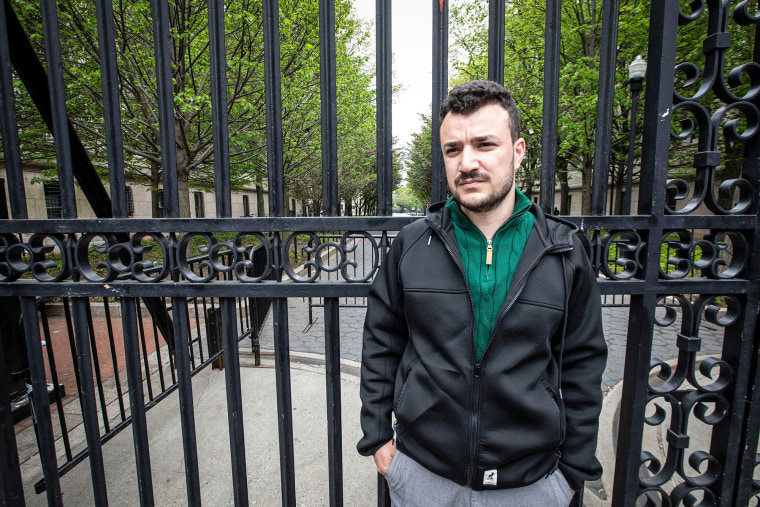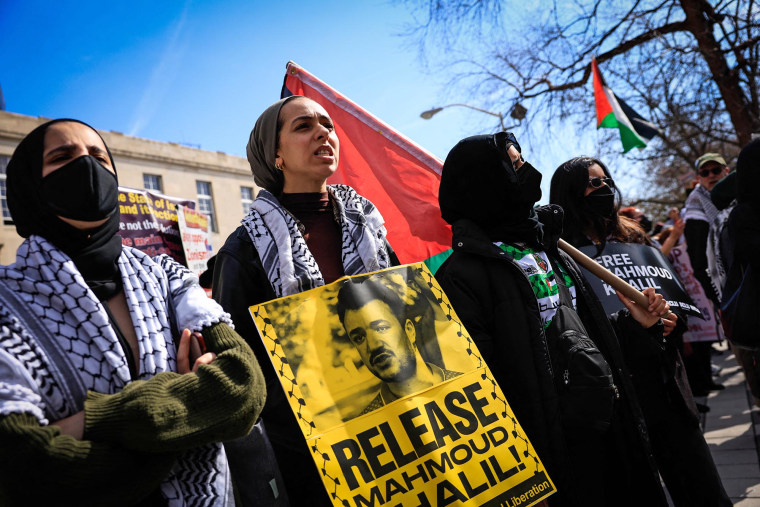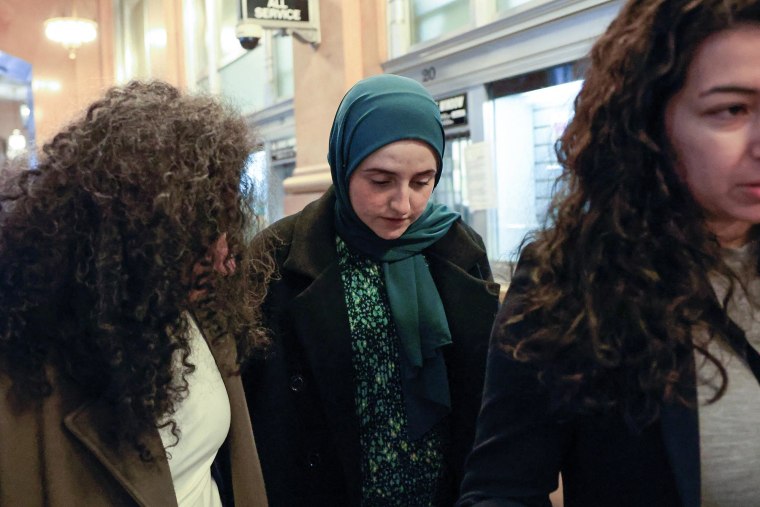An immigration judge on Friday ruled that the Trump administration can deport Columbia University graduate student Mahmoud Khalil, a decision that comes a month after his arrest prompted national outrage and marked the start of the federal government’s broader crackdown on foreign students.
The Louisiana judge affirmed the Trump administration's argument that Khalil's beliefs threaten national security and justify his deportation.
“The court will sustain charge of removability," Judge Jamee Comans said.
Khalil, 30, has until April 23 to file for relief and can remain in the United States until then. A federal judge in New Jersey has temporarily barred Khalil’s deportation while he fights a similar challenge there.
Khalil addressed the court after the ruling.
"I would like to quote what you said last time that there's nothing that's more important to this court than due process rights and fundamental fairness," he said in a statement his defense team presented after the hearing. "Clearly what we witnessed today, neither of these principles were present today or in this whole process. This is exactly why the Trump administration has sent me to this court, 1,000 miles away from my family. I just hope that the urgency that you deemed fit for me are afforded to the hundreds of others who have been here without hearing for months.”

His legal team said it will "continue working tirelessly until Mahmoud is free."
“Today, we saw our worst fears play out: Mahmoud was subject to a charade of due process, a flagrant violation of his right to a fair hearing, and a weaponization of immigration law to suppress dissent," his attorney, Marc van der Hout, said in a statement. "This is not over, and our fight continues."
Khalil's defense team is seeking a preliminary injunction from the federal court in New Jersey. It would release him from custody and could block the Trump administration policy of arresting and detaining noncitizens for speech critical of Israel and in support of Palestinian people in Gaza, the team said in its statement on Friday.
Defense team attorney Ramzi Kassem said on MSNBC Friday that the lawyers immediately went before the New Jersey-based federal court to update it on the matter in Louisiana, as ordered.
He argued the Trump administration's strategy in the case, to fight for every possible legal justification, is "backfiring for them" and exposing the case as driven by Khalil's speech.
"For a country that values free speech, … that should just not be possible," he said of possible deportation over Khalil's participation in campus protests.
Department of Homeland Security Secretary Kristi Noem in a statement Friday called Khalil. She accused him, without providing evidence, of supporting terrorists and harassing people based on their faith.
"Mahmoud Khalil hates the United States and what we stand for — so his removal should come as welcome news," she said. "It is a privilege to be granted a visa or green card to live and study in the United States of America. When you advocate for violence, glorify and support terrorists that relish the killing of Americans, and harass Jews, that privilege should be revoked, and you should not be in this country. Good riddance.”
White House Assistant Press Secretary Taylor Rogers said in a statement that the administration is "committed to the enforcement of our immigration laws and will take swift action to remove aliens who pose serious adverse foreign policy consequences for the United States."
A spokesperson for Columbia University declined to comment.
Khalil, who helped lead student protests against the war in Gaza at the Ivy League school last year, was detained on March 8 by federal authorities at his university-owned apartment complex in New York City. He has since been in custody at a Louisiana immigration detention center.
The Trump administration has maintained publicly that it has the authority to deport Khalil — a green card holder and more recently a permanent resident — because he "led activities aligned to Hamas, a designated terrorist organization."

The administration also repeatedly cited a rarely invoked provision from a 1952 law — the Immigration and Nationality Act — which allows the secretary of state to deport noncitizens if their presence in the country threatens U.S. foreign policy.
Lawyers for the government have also alleged that Khalil withheld information about past affiliations and employment, such as his work for the Syria Office in the British Embassy in Beirut, on his application for permanent residency.
The government's allegations that Khalil failed to disclose crucial information came on March 23, two weeks after his arrest. His defense team said in court in Louisiana on Friday that Khalil has not been presented with an arrest warrant.
The government also said Khalil was a public affairs employee for the United Nations Relief and Works Agency for Palestine Refugees and didn't disclose it. His lawyers said he was not a public affairs employee but rather had an internship at the organization, which has traditionally counted the United States as its largest funding contributor.
The refugee support agency, known as UNRWA, did not immediately respond to a request for comment.
The judge had pressed the administration to submit evidence supporting their claims and justification for Khalil's deportation by Wednesday.
Secretary of State Marco Rubio responded Wednesday evening with a brief memo obtained by NBC News that cites Khalil’s beliefs in justifying his deportation.

Rubio said that while Khalil’s "past, current or expected beliefs, statements, or associations that are otherwise lawful," the provision allows Rubio alone to "personally determine" whether Khalil should be allowed to stay in the country.
Comans said Friday that the memo alone deemed Khalil removable, and he denied defense efforts to obtain underlying evidence and have Rubio answer questions. He called the memo a "certified letter of conviction" that needs no further explanation.
Rubio — who is a child of Cuban immigrants — said last month that the State Department had revoked more than 300 student visas and would continue to do so.
According to an NBC News analysis, as of Wednesday, officials had revoked the visas of foreign students — many of whom are Middle Eastern — in at least 29 states.
Video of the March arrest of a Tufts University student, Rumeysa Öztürk, showed several plainclothes Department of Homeland Security agents surrounding her, grabbing her wrists, and moving her into an SUV while she screamed out in confusion. Her lawyers argue that she was targeted for writing an opinion piece in her school newspaper that criticized Tufts' response to the war in Gaza.
An international student at the University of Florida was deported late last month after he was arrested and accused of traffic violations, his family and local officials said.
DHS announced a new task force on Wednesday to monitor the social media activity of immigrants, including foreign students, for antisemitism. Three sources familiar with the operation told NBC News that officials will screen approximately 1.5 million international students for potential grounds to revoke their visas.
Khalil's arrest prompted protests at Columbia, the epicenter of last year's demonstrations, at Trump Tower, and across the nation.
Columbia students who spoke with NBC News since Khalil's arrest said that speaking out had become "too dangerous" at the university, once known as a venue for challenging authority.
The administration has also revoked hundreds of millions of dollars in federal funding to several universities in recent weeks — including Columbia, Harvard and Princeton — citing dissatisfaction with how they handled last year’s protests against the war in Gaza.

